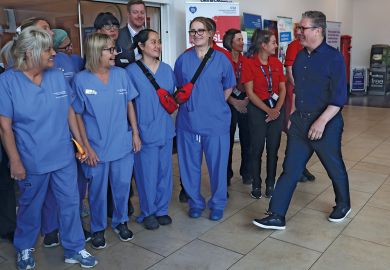Several years ago I attended a research session hosted by the American Institutes of Research at the annual meeting of the American Educational Research Association. The studies presented suggested that access to computers and the internet was increasing at all educational levels. The researchers went on to remark that these types of changes and reform were significant for American schools. Following the talks, the technology adviser to the US secretary of education gave the researchers and their studies rave reviews, and remarked that this was exactly the information needed for all levels of policy-making. To my surprise, there had been no mention of teaching or learning in these presentations. Rather, it seemed as if academic development were a given outcome of this technological boon. It is now years later and even the casual observer knows that schools are wired. In fact, it is estimated that US public schools spent $5.5 billion and universities an additional $2.7 billion on computer hardware, software and infrastructure in 1999. Yet what has this tremendous investment in technology brought to American schools? Larry Cuban's response in Oversold and Underused is a poignant and emphatic one - nothing.
Although much of Cuban's work has been more philosophical in nature, this latest volume documents an extended study of the impact of computers in American schools. For this investigation, Cuban headed straight to the heart of American technology innovation - Silicon Valley. His observations and interviews at 11 ethnically and socioeconomically diverse preschools/kindergartens, two high schools and at Stanford University served as the basis for his conclusions. His research questions were simple. To what extent do students have access to computers in classrooms, and how have computers changed the nature of instruction?
Results from this comprehensive study were similar for all educational levels regardless of ethnicity, gender or socioeconomic status. Just as the National Center for Educational Statistics reported in 2001, Cuban found that students aged three and up have access to computers. Moreover, differences due to social class were practically non-existent. These are not startling findings. Data emerging from the government and independent researchers are clear on this point.
What is startling, however, is Cuban's conclusion that computers have had very little impact on teaching. The teachers he studied simply adapted computers to sustain, rather than transform, their instructional approaches as exemplified in his observation of preschool and kindergarten classrooms. "If anything, the 'computer center' unintentionally sustained the traditional early childhood model - despite the insistent efforts of some to push academic (work) for three-year-olds. And that is the ultimate irony. In pressing early childhood teachers to use computers... zealous parents and educators have not transformed preschools and kindergartens... they have watched a technological innovation get reinvented into a benign addition to traditional early childhood programs."
Cuban's message, however, is not that computer access is high while computer use is low and often instructionally uninspired. Nor is it that computers will invariably suffer a similar fate to their technological ancestors (ie radio, film and television). Rather, his point is a philosophical, societal and even moral one. To what end should policy-makers, the business and public sectors, and educators strive for technological advancement in schools? Indeed, Cuban posits that technology-based reform runs counter to the mission of schools. "Contemporary reformers have forgotten the democratic mission at the heart of public schooling, ignored the critical importance of social capital in strengthening civic behaviours, and proven too narrowly committed to technocratic solutions of school problems - all of which tempts me to call for a moratorium on buying any more computers for K-12 schools." This bold statement on the motives and morals of technology reformers is long overdue. Policy-makers, the business and public sectors, and educators should pause and reflect on the goals of schooling and the specific educational role that computer technology should play in furthering those goals.
Although I share Cuban's sentiments concerning democratic ideals, I am very troubled that he offers no discussion of the impact of computers on learning. Does no one care about learning? How can an illiterate child grow up to promote liberal democratic ideals? It may be that Cuban found such discussion unnecessary given that computer use remains low in classrooms. Against this, I would argue that learning is often informal, and such informal learning can be extremely influential on student's knowledge and beliefs. Perhaps it is in the realm of student learning, rather than in teaching, that the effects of technology will be found. Perhaps.
Nonetheless, Cuban's book is a must-read for politicians, parents, school administrators, teachers, technophiles and technophobes. As a society, we must move beyond reforming for the sake of reforming. Schools should invest in computers because they enhance teaching and learning, not just because such technology is available and enticing.
P. Karen Murphy is assistant professor of educational psychology, Ohio State University, US.
Oversold and underused: Computers in the Classroom
Author - Larry Cuban
ISBN - 0 674 00602 X
Publisher - Harvard University Press
Price - £19.50
Pages - 250
Register to continue
Why register?
- Registration is free and only takes a moment
- Once registered, you can read 3 articles a month
- Sign up for our newsletter
Subscribe
Or subscribe for unlimited access to:
- Unlimited access to news, views, insights & reviews
- Digital editions
- Digital access to THE’s university and college rankings analysis
Already registered or a current subscriber? Login



